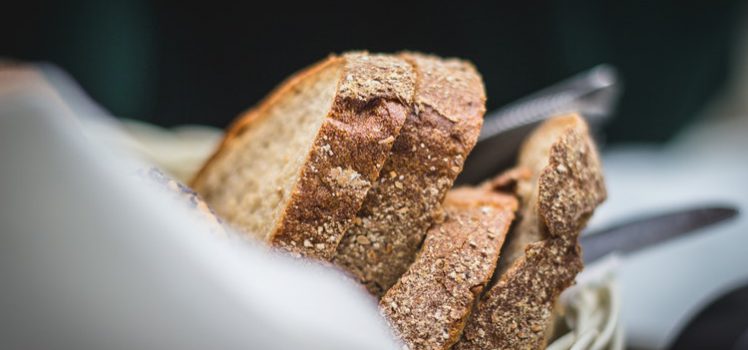What Is The Role Of Fibre And Is Gluten The Devil? Two Of Your Most Pressing UC Diet Questions

For a long time now there has been an ongoing debate about how the course of development of ulcerative colitis is or isn’t related to diet. And while researchers widely agree that ulcerative colitis (and other IBDs for that matter) is not directly caused by our diet, there are still differences of opinion backed up by research about how different foods affect the symptoms of a person with UC.
Which food groups or specific foods cause irritation and worsen flare-ups? What should a person with UC eat on a daily basis in order to maintain remission and prevent a relapse? How diet relates to UC seems to be an ever topical question for researchers, nutritionists, and patients.
Going through the clinical trials that pop up for UC when you search on FindMeCure you’ll be surprised to see how many of them are trying to answer precisely that question. And curcumin is not the only nutrient under investigation.
Probiotics seem to be the new it-supplements under investigation for their therapeutic properties when it comes to the IBD diet. But until just recently it was actually dietary fibre that was in question… and though not as popular now, the argument is still going on.
Perhaps it was the 1978 Davies and Rhodes study that gave fibre a bad name. In the study UC patients in remission were divided into two groups in order to assess whether a high fiber diet can help sustain a remission. The first group only took medicine, while the second group increased the fibre in their diet and two weeks into the study discontinued their medicine.
20% of the first group (the one that only took medicine) didn’t remain in remission, compared to 75% of the second group (the one discontinued their medicine) that eventually relapsed. The researchers concluded that dietary fibre does not maintain remission.
This line of thinking doesn’t seem fair, however, and a more precise conclusion would be that a high-fibre diet cannot substitute drug treatment. As for the role dietary fibre plays as a supplement and not a replacement for drug treatment, other studies were about to be conducted.
One of these studies, Hallert et al., implies that, on the contrary, dietary fibre can actually ease symptoms of discomfort in people in remission. The placebo-controlled clinical trial introduced Plantago ovata supplementation and in 4 months 69% of the patients in the group that received the real treatment (the Plantago ovata supplement in this case) reported improvement of their symptoms, compared to 24% of the group that received the placebo.
The 2015 review of similar studies assessing the tolerance for fibre in people with UC or the effects of a high-fibre diet on remission in UC patients concludes that dietary fibre shouldn’t be limited when in remission.
Although cautious, stating that more research is needed, the review suggests that based on the data we currently have, supplementation of some kinds of fibre is, in fact, beneficial for UC patients in remission. Apart from preventing relapses, it increases the production of SCFA (short-chain fatty acids) that stimulate the ‘good’ microflora and suppress the growth and spreading of pathogens in the colon.
Even if dietary fibre supplementation can be an important part of UC therapy, it needs to be done under the supervision of a trained professional – your primary physician or a trained nutritionist. So don’t just add whole-grain bread to every meal and expect to see measurable results.
Another proverbial offender these days is gluten. Gluten has a bad reputation for not only increasing inflammation but also causing weight gain, bloating, skin issues and what have you. How much of it is true, though?
On the pro-gluten side of the controversy there are studies that suggest only people with gluten sensitivity are negatively affected by gluten and for the rest of us living with or without it wouldn’t make much difference. Some nutritionists even warn against cutting off gluten completely, fearing that making drastic changes to our diets can cause more stress and deprivation than anything else.
The anti-gluten camp has a compelling argument, though. Gluten is a fairly recent addition to the human diet and we have survived so far as a species without it. As for the adverse effects of gluten on ‘regular’ people who don’t report gluten intolerance (celiac gluten sensitivity), another study suggests that they are in fact significant enough to give us pause when reaching for the loaf of bread or a serving of pasta.
In 61 adults who did not suffer from celiac disease or wheat allergy the severity of the symptoms they reported prior to the study (which led them to believe they have gluten sensitivity) increased after one week of 4.375 g/day intake of gluten, compared to the group that received placebo.
The evidence remains contradictory either way and clearly, more research is needed to improve UC patients’ diet. We are not nutritionists, however, and all we did was review some of the research that has been conducted so far on these controversial food groups.
We strongly advise you turn to a specialist if you’re considering making a significant change to your diet. And if you’re interested in what aspects of nutrition are under investigation for their potential therapeutic effect in IBDs you can check out FindMeCure’s database for all ongoing or upcoming clinical trials that deal with those questions.

